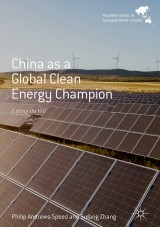Details

China as a Global Clean Energy Champion
Lifting the VeilPalgrave Series in Asia and Pacific Studies
|
85,59 € |
|
| Verlag: | Palgrave Macmillan |
| Format: | |
| Veröffentl.: | 07.01.2019 |
| ISBN/EAN: | 9789811334924 |
| Sprache: | englisch |
Dieses eBook enthält ein Wasserzeichen.
Beschreibungen
This book assesses China’s reputation as a global clean energy champion, and applies institutional and public policy theories to explain how the country has achieved so much and why there continue to be so many unintended consequences and constraints to progress. It considers the extent to which the government has successfully boosted the manufacture and deployment of low-carbon electricity generating infrastructure, cleaned up thermal power generation, and enhanced energy efficiency, dramatically constraining China’s rising carbon dioxide emissions, but also examines the substantial political and financial capital required to reinforce the predominantly administrative policy instruments and the mix of special interests and poor coordination that are endemic to the energy sector. Arguing that the current approach seems to be encountering ever diminishing returns, the book considers whether ongoing sector reforms and the new national emissions trading scheme can reinvigorate the nation’s clean energy trajectory.<p></p>
1. Introduction.- 2. China as a Global Clean Energy Champion: Goals and Achievements.- 3. Transitions, Institutions and Public Policy.- 4. Governance in China.- 5. Low-Carbon Electricity.- 6. Low-Carbon Electricity Technology, Innovation, Manufacturing and Internationalisation.- 7. Fossil Fuels.- 8. Energy Efficiency and Conservation.- 9. The Water-Energy-Food Nexus.- 10. Carbon Pricing.- 11. Conclusions.
<div><p>Philip Andrews-Speed is a Senior Principal Fellow at the Energy Studies Institute, National University of Singapore, Singapore. He has 35 years in the field of energy and resources, starting his career as a mineral and oil exploration geologist before moving into the field of energy and resource governance. Until 2010 he was Professor of Energy Policy at the University of Dundee and Director of the Centre of Energy, Petroleum and Mineral Law and Policy. His main research interest is the political economy of energy and resource governance. Recent books include <i>China, Oil and Global Politics </i>(with Roland Dannreuther) and <i>The Governance of Energy in China: Transition to a Low-Carbon Economy.</i><br></p>Sufang Zhang is Professor at the School of Economics and Management, North China Electric Power University (NCEPU), China. Before joining the NCEPU in 1993, she worked in provincial government as a project officer in charge of international aid programmes. Her research field focuses on energy policy, China’s renewable energy policy in particular. She has directed and participated in many renewable energy research projects supported by China’s central and local government, as well as international organizations such as the Energy Foundation China. Recent research projects include <i>Institutional Constraints to the Renewable Energy Development in China.</i><p> </p></div>
This book considers China’s role as a rising champion of clean energy and document the policy decisions and actions which have underpinned this evolution. It considers the construction of the world’s largest fleets of advanced coal-fired power stations, wind farms and solar photovoltaic arrays, examines sustained efforts to reduce national GDP intensities of energy and CO2 emissions, and assesses the rhetoric of government announcements on national policy and international commitments, including the Thirteenth Five-year Plan for Energy (2016-2020). The book notably considers the factors that have supported these achievements, including the availability of large amounts of capital, the role of state-owned companies with soft budgetary constraints, and many forms of indirect support from local governments. It also explores the obstacles to reaching the formal goals of reducing air pollution and CO2 emissions as well as the costs and unintended consequences of these policies, and identifies those parts of the energy supply chain where the governance of energy has been less effective in terms of energy efficiency and environmental protection. <br><p></p>
Presents an overview of China’s energy sector, applying the analytical framework to wider aspects of governance in China Explores the clean electricity sector in China, both the energy industry and the manufacturing industry Examines the wider context of China’s clean energy, namely fossil fuels, energy efficiency and the resource nexus. Chapter 10 assesses the outlook for carbon pricing in China
Diese Produkte könnten Sie auch interessieren:

Mapping Sustainability

von: Nazli Choucri, Dinsha Mistree, Farnaz Haghseta, Toufic Mezher, Wallace R. Baker, Carlos I. Ortiz

96,29 €

Fertility, Living Arrangements, Care and Mobility

von: John Stillwell, Ernestina Coast, Dylan Kneale

96,29 €














